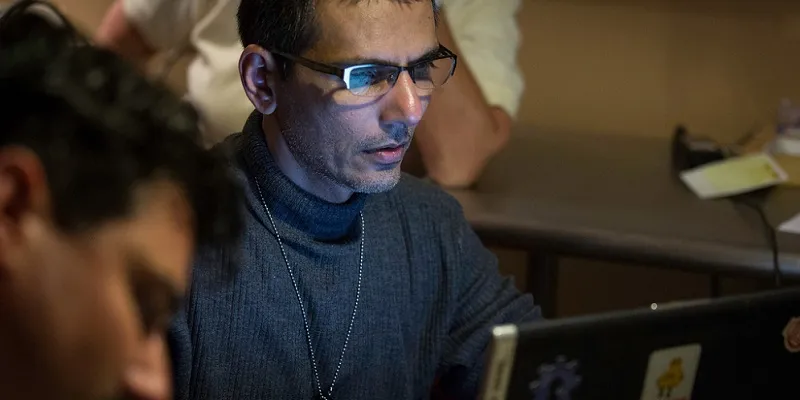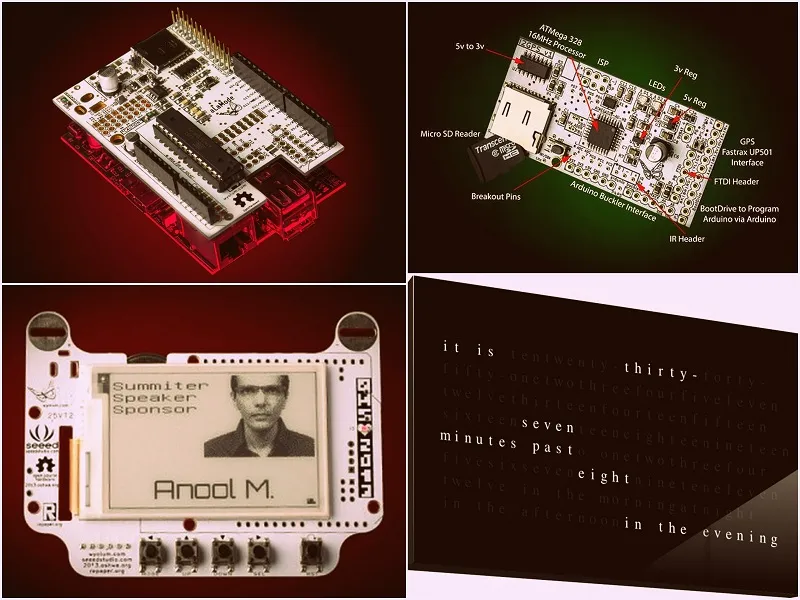[Techie Tuesdays] The story of a hardware genius, Anool Mahidharia
There is always a correlation between your interests and your background. And if your job coincides with your interest then all three echo with each other. Anool Mahidharia and his love for hardware testify the above statement to the very core.

Forty-nine-year-old Anool is settled in Mumbai with his family business, Lumetronics. The company which was started by his parents in 1978 manufactures custom built, test and measuring equipment for product testing as per international norms, calibration services and related information. Anool has been dealing in hardware for more than three decades now and his life journey is nothing less than a mine of resources for any open source hardware enthusiast. Apart from his relentless love for open hardware, you can spot him on Mumbai roads cycling to work or find him indulging his hobby, origami.
Internal combustion engine of LML Vespa
Intrigued by his curiosity and interest, Anool would spend his school days tinkering with hardware and instruments at home. He was greatly inspired by his father who didn’t even go to a college and yet was a hardware hacker, an amateur radio operator, had flown aircrafts apart from starting up the family business in 1978. Recalling an incident he says,
I learnt about internal combustion engine by dismantling and reassembling our scooter LML Vespa with my father. I had even worked in a project of my father’s friend which involved technical drawing for a catalogue of lighting fixtures.
All these activities pushed Anool deeper in the world of hardware and he could very well associate himself there. By the time he was in college, he already knew what his teachers would teach him.
Tryst with German product, French company and family calling
Anool didn’t want to join his family business straight after his college. He preferred gaining exposure outside and moved to Bangalore in 1986. It was the electronics boom in the city then and his first job was that of a sales professional at Shilpa International. The company was marketing German semiconductor devices and the two years there made Anool realize that sales was certainly not his cup of tea. Before settling in Bombay, he spent another two years in Bangalore at a French company, IMAJE which was making industrial inkjet printers. Both jobs gave him enough experience and ideas.
In 1990, Anool decided to get married and settle down in Mumbai. He joined his family business, Lumetronics. “There are not many companies across the globe doing what Lumetronics does. We design instruments for testing the products for safety and sell it to manufacturers of appliances like geysers, mixer & grinders, and other electronic items. These instruments are individually made and strictly adhere to the guidelines issued by IEC (International Electrotechnical Coommission),” he says about his work at Lumetronics.
Designing and selling open hardware projects to earn ‘sweat equity’
In 2010, Anool got involved with Open Hardware as a Hobby. He improvised and built a bicycle brake light originally designed by Justin Shaw of Washington DC and published it on Instructables and WYO Innovations. This marked the beginning of WyoLum. WyoLum is like an online or virtual hackerspace whose members are spread around the globe and design Open Hardware projects like:
ClockTHREE-Jr: A 9"x9" Open Hardware word clock supporting 4 languages: English, German, Dutch and French.
I2GPS v1 : An easy to use RTC, GPS and SD memory card interface.
AlaMode : AlaMode is a stackable, Arduino compatible board for the Raspberry Pi that plugs in to its GPIO header.
Badger : An e-reader badge and shield offering open source of e-paper (which is predominantly closed source). This was used as badges for the Open Hardware summit.

All these products are sold via their partners, Seeed Studio and the money from these projects is distributed using a method we developed called "WyoLum Sweat Equity".
Giving back to the Open Hardware community
The money earned from the Open Hardware projects is put back into the open source movement. Anool says,
In 2012, our turnover from these projects was over $100,000. We buy tools such as 3D-Printers, CNC machines and Laser Cutters for our team members from this money. Every year, we give away grants to deserving projects via the WyoLum Innovation Grant. We have also been sponsoring the Open Hardware Summit since the last three years.
Last year, Anool and Justin conducted a training program in Washington on Circuit Board design (EDA) which helped a few people get started off on their own Open Hardware designs. He now wants to replicate this in India with his local hacker space in Mumbai, Makers Asylum.
Open Hardware in India

Anool believes that there is a need to work on more projects in hardware from India. US & Europe have already realized the power of open source but there is still disagreement to it in India. People think that open source is not commercially viable, which is clearly not the case. The biggest example is 3-D printing technology. It all started as an open source movement and churned out profitable ventures like Makerbot. Arduino, the recent global phenomena is another case where the software and hardware are completely open and can be leveraged to make profitable entities.“Traditionally Indians are very innovative people as we work with constrained resources. We can bank on resources like MIT Media Labs, Fab Labs, JaySo Labs etc to contribute a lot of innovation in the coming times. Recently, the government of India has also announced two upcoming fabrication facilities to boost the Open Hardware ecosystem.”
Anool spoke on ‘The Maker Movement’ and demoed a ‘drawing robot’ at the MakerFest held at Ahmedabad early this year.
Taking Open Hardware to schools
Early exposure to Open Hardware is better for children as there are more chances of them getting interested in it.
I have seen children of 12-13 years trying out some amazing things at MakersAsylum. Schools should have Ardunio boards and include open hardware in the curriculum. A Raspberry Pi running on Linux can be custom made for around $30 only. These can replace computers in schools and also allow students to experiment with the power of Open Hardware.
He understands that most of the engineers gravitate towards software engineering in college and thus leaving a void in the hardware industry. Anool is hopeful that taking Open Hardware to schools will help fill this void and initiatives like MakerAsylum can catalyze the overall process, thus bringing Open Hardware revolution in India.






![[Techie Tuesdays] The story of a hardware genius, Anool Mahidharia](https://images.yourstory.com/cs/wordpress/2014/02/Anool-Mahidharia.jpg?mode=crop&crop=faces&ar=16%3A9&format=auto&w=3840&q=75)




![[Weekly funding roundup July 20-26] VC fund inflow drops to below $100M level](https://images.yourstory.com/cs/2/220356402d6d11e9aa979329348d4c3e/funding-lead-image-1669386008401.jpg?mode=crop&crop=faces&ar=1%3A1&format=auto&w=3840&q=75)